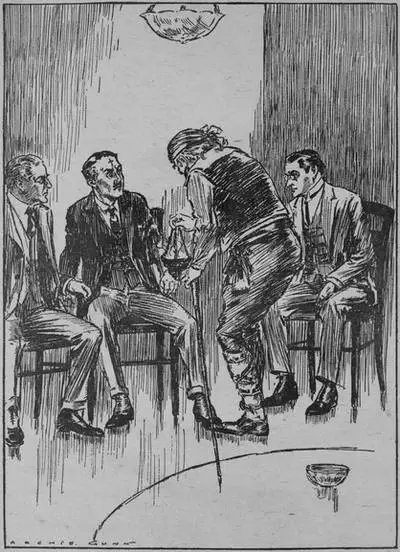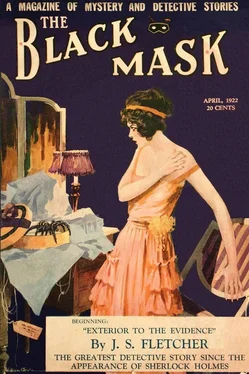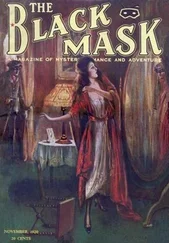J. Fletcher - The Black Mask Magazine (Vol. 5, No. 1 — April 1922)
Здесь есть возможность читать онлайн «J. Fletcher - The Black Mask Magazine (Vol. 5, No. 1 — April 1922)» весь текст электронной книги совершенно бесплатно (целиком полную версию без сокращений). В некоторых случаях можно слушать аудио, скачать через торрент в формате fb2 и присутствует краткое содержание. Город: New York, Год выпуска: 1922, Издательство: Pro-distributors Publishing Company, Жанр: Детектив, на английском языке. Описание произведения, (предисловие) а так же отзывы посетителей доступны на портале библиотеки ЛибКат.
- Название:The Black Mask Magazine (Vol. 5, No. 1 — April 1922)
- Автор:
- Издательство:Pro-distributors Publishing Company
- Жанр:
- Год:1922
- Город:New York
- ISBN:нет данных
- Рейтинг книги:3 / 5. Голосов: 1
-
Избранное:Добавить в избранное
- Отзывы:
-
Ваша оценка:
- 60
- 1
- 2
- 3
- 4
- 5
The Black Mask Magazine (Vol. 5, No. 1 — April 1922): краткое содержание, описание и аннотация
Предлагаем к чтению аннотацию, описание, краткое содержание или предисловие (зависит от того, что написал сам автор книги «The Black Mask Magazine (Vol. 5, No. 1 — April 1922)»). Если вы не нашли необходимую информацию о книге — напишите в комментариях, мы постараемся отыскать её.
The Black Mask Magazine (Vol. 5, No. 1 — April 1922) — читать онлайн бесплатно полную книгу (весь текст) целиком
Ниже представлен текст книги, разбитый по страницам. Система сохранения места последней прочитанной страницы, позволяет с удобством читать онлайн бесплатно книгу «The Black Mask Magazine (Vol. 5, No. 1 — April 1922)», без необходимости каждый раз заново искать на чём Вы остановились. Поставьте закладку, и сможете в любой момент перейти на страницу, на которой закончили чтение.
Интервал:
Закладка:
Upon the forehead of Hitchens was the sign of the cross!

For a second there was silence — cold, oppressive silence. The secretary gazed from one to another of us mutely, questioningly. Then his eyes sought the mirror above the fireplace. Afterward I recalled that Dwyer had seated him in front of the glass. His face became drawn. The sweat stood out on his forehead in great beads.
Slowly, as if stunned, his fingers sought the accursed mark upon his forehead. He spat upon his hand and rubbed the spittle across the spot as if to erase it. He held the tips of his fingers in front of his eyes, surveying them thoughtfully, dazed.
Then, without warning, he dropped to his knees, his arms outstretched towards the swarthy man within the circle.
“I did it! J did it!” he shrieked.
IV
“No, I never met Lipki until yesterday,” Dwyer chuckled to us as, two hours later, Hitchens safely lodged in jail, he sat with the coroner, the sheriff and myself in the former’s parlor and went over the various phases of the case.
“I’m a fairly good judge of character and when I noticed him begging on Main Street yesterday I immediately placed the old fellow as being far above the average of his class mentally and capable of playing almost any part he might be called upon to take. I realized far better than the rest of you that the murderer was too clever to be captured unless some subterfuge was used and when you appealed to me, Stevenson, my thoughts reverted at once to the old man. A falsehood or two in the interests of justice is, in my opinion, perfectly allowable. And that I was correct in my estimate is proved by what happened.
“What appealed to me from the very start was the apparent lack of motive. Had we been able to supply a motive we might have been able to have laid our hands on the man who struck the blow. But in the absence of one, it became necessary to take some radical step. To imagine that one of the farmers hereabouts would become jealous enough to strike Fellows down was absurd. And, granting that some of them might have the nerve, they lacked the imagination to pull off so mysterious a crime.
“I was confident in my own mind that Hitchens was the guilty party. Why? Because he was the only man who had an opportunity to kill Fellows. But, on the other hand, his frank statements apparently eliminated him from the suspects.
“Let us analyze the affair a trifle deeper: Doctor Andrews swears that Fellows was killed shortly after midnight. We now know that he was correct. But Hitchens bobs up with the story of being in conversation with the murdered man at two o’clock. He was able to prove his statements by two reputable and disinterested witnesses — Landes, the chauffeur, and Phelps, the drug clerk. Therefore my conclusion was that either Hitchens was lying or that the physician was wrong. But my experience has taught me that medical men are, as a general rule, cold-blooded — that is, they figure things out with mathematical accuracy and, by the law of averages, they are right ninety-nine times out of a hundred. Therefore Hitchens was lying. But so far as we knew there was no motive.
“Now, the average man has deep within him a streak of superstition and a fear of whatever he does not understand. Therefore I took the indolent attitude before the servants, finally working things up to a climax so that they expected wonderful things from the gypsy whom I had touted so highly. As soon as you gave your permission I hunted up the old man, whose name, by the way, is not Lipki, but Rodereigo. For ten dollars he agreed to play the part the way I told him to — and that he sustained my estimate of him I believe you will all agree. I spent the afternoon in coaching him.
“I felt that, in case Hitchens did not confess, we would have lost nothing. But I was betting on the superstitious streak in his makeup and won out.
“We all know now what his motive was. He had been systematically robbing his employer for years. Fellows had become suspicious and last night notified the secretary that they would go over the books together today. Hitchens waited until his employer was sleeping, then entered the room by means of a key that he had secured possession of, struck the fatal blow, then went through the mummery of going to the village after the bromide, thus providing himself with an almost perfect alibi. With Fellows dead, he figured that, as confidential man, he would be retained for a year or two to come, finally reaching a point where he could get his hands on a large sum of money and make his escape before his defalcations were discovered.”
“But,” rumbled the sheriff, “I’m still in the dark as to how the gypsy caused that black cross to appear on his forehead just by mumbling a few prayers. Those people know a lot of black art that we more civilized people will never be able to understand.”
Dwyer grinned. “I furnished the ‘black art’ myself,” he answered. “It cost me ten cents at the drug store. The old man made the cross on Hitchens’ forehead first, if you will recall the affair. He had just dipped his hand into the vessel of what looked like water. He only pretended to dip his hand into it when he annointed the rest of you. The heat of the brazier brought out the mark — or started it — when he held it up and pretended to peer into your faces.
“What was it? Merely a ten percent solution of ammonium chloride — the same stuff from which invisible ink is made. The old man’s skin being dark, it didn’t come out on his hand as it did on Hitchens’ forehead. And that’s the whole story.”
A Track-and-a-Half
by Walter Deffenbaugh
I
Beneath the library window of the millionaire, Garret Garrison, the footprints of a burglar showed plainly in the flowerbed that ran alongside the house. The bright sun following a rainy night had retained them perfectly and the two detectives breathed together in a sigh of satisfaction as they saw there a vitally distinguishing mark.
The toe of each sole had been newly repaired with a patch. Here undoubtedly one of the thieves who had committed the $15, 000 jewel robbery the night before had left a trace that would simplify their work and send him to prison. In these tracks he had undoubtedly stood while he operated the jimmy whose marks showed on the casing above.
A little outside, but still within the flowerbed, were the marks of his heels where he had landed as he leaped back into the yard after his fight with the butler. Here the heels were deeply indented, but the prints of the same repaired toes were again in evidence. In the damp soil the marks of the burglar’s feet were plain, showing where he had entered the grounds through the hedge and crashed out again.
Detective Sergeant Harrison was showing his associate, Harbin, over the ground for the first time. Harbin had been working on another angle of the case.
“Now look up here, Harbin,” he said and led the way to the soil under the adjoining window of the Garrison drawing-room. “Here’s where the other guy jumped out.”
Sure enough, there were the prints of another pair of heels and the marks of a running man’s footprints across the lawn to the same break in the hedge. But on these prints there was no such distinguishing mark as upon the others. The shoes that made these might have belonged to any one of a million men in the big city.
For perhaps twenty minutes the two detectives paced in silence up and down the lawn alongside the house. Twice, with the aid of stepladders, they inspected every window within reach from the ground. Outside the house, they were satisfied, there was not another trace of the thieves who had broken in and stolen a pearl necklace worth $10, 000 and other trinkets worth $5, 000 more. They must be content to rest their case upon these marks in the dirt and the story of the butler who had surprised one of the marauders in the hallway of the mansion.
Читать дальшеИнтервал:
Закладка:
Похожие книги на «The Black Mask Magazine (Vol. 5, No. 1 — April 1922)»
Представляем Вашему вниманию похожие книги на «The Black Mask Magazine (Vol. 5, No. 1 — April 1922)» списком для выбора. Мы отобрали схожую по названию и смыслу литературу в надежде предоставить читателям больше вариантов отыскать новые, интересные, ещё непрочитанные произведения.
Обсуждение, отзывы о книге «The Black Mask Magazine (Vol. 5, No. 1 — April 1922)» и просто собственные мнения читателей. Оставьте ваши комментарии, напишите, что Вы думаете о произведении, его смысле или главных героях. Укажите что конкретно понравилось, а что нет, и почему Вы так считаете.












